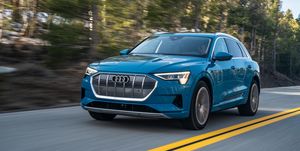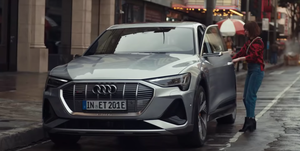- Audi conducted its own test with the e-tron electric SUV pulling a 4000-pound trailer, which provides some interesting data about how towing affects electric cars.
- The e-tron went on a 504-mile trip from Tulsa, Oklahoma, to Austin, Texas, stopping at 150-kilowatt fast chargers along the way.
- It averaged a high 769 watt-hours per mile (Wh/mi), which would make for a low driving range of around 105 miles.
What happens to an electric vehicle’s efficiency when towing? That’s the question that Audi set out to answer with its e-tron EV, which recently took a 504-mile journey from Tulsa, Oklahoma, to Austin, Texas, while towing a 4000-pound trailer that, by the way, was carrying a GM EV1 owned by Tulsa Tech.
The obvious result is that the e-tron is far less efficient while towing a trailer, as any gasoline-powered vehicle would be. It averaged 769 watt-hours per mile (Wh/mi) at an average speed of 60 mph in 35-degree rainy weather. By our calculations, it would achieve a range of just around 105 miles. That means frequent stops for charging.
For comparison, an unladen e-tron is rated at 204 miles in the EPA’s combined test and 203 miles in the EPA’s highway test. It achieved an estimated range of 190 miles in C/D‘s 75-mph highway test, averaging 502 Wh/mi. Granted, there are many differences between Audi’s test and our own test, so it’s not exactly an apples-to-apples comparison. Our test has a higher average speed, was conducted in 68-degree weather, and takes into account charging inefficiencies.
Nonetheless, this data is interesting for showing how EVs handle towing, and we hope to see more testing like this in the future. The e-tron is rated to tow 4000 pounds with its optional $650 towing package. Tesla claims that the Model X can tow up to 5000 pounds when properly equipped.
Source: Motor - aranddriver.com





